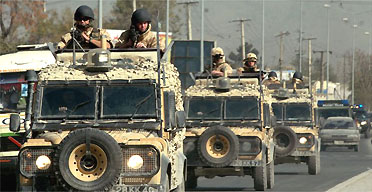
The British army is planning to extend its training for young recruits because so many potential soldiers are obese, an official report discloses today. The military has had to relax its criteria over the physique and weight of recruits as a result of the problem.
"Increasing levels of obesity and resultant health problems reduces the number of young people able to join the services", warns the National Audit Office, parliament's independent watchdog. It points to research by the army last year which showed that only a third of all 16 year-olds would pass the body mass index set for all recruits to the forces.
Earlier this year, the army changed the index targets for male recruits from 28 to 32 because of the increased levels of obesity among Britain's youth.
The NAO report also warns that the armed forces are undermanned, suffering from severe shortages in crucial roles, and that the problems have been compounded by more service personnel across the ranks leaving early.
It paints a picture of an army, navy, and airforce struggling to cope with the demands placed on them in Iraq and Afghanistan, with no end in sight to a tempo of operations more intense than military planning chiefs ever envisaged.
Mark Andrews, who oversaw the report, said: "The longer [this] goes on, the more strain it puts on people ... clearly the armed forces are under strength."
It also reveals that the army found that 42% of parents would be less likely to encourage their children to join the army because of operations in Iraq. "Since 2001," says the audit office, "the armed forces have consistently operated at or above the most demanding combination of operations envisaged" by defence planners. In a comment suggesting the situation is even worse than official figures make out, the report adds: "Manning requirements have not been adjusted to reflect the current levels of activity".
It echoes recent warnings by General Sir Rupert Dannatt, the head of the army, about the pressures his soldiers are being asked to endure.
Edward Leigh, the Conservative chairman of the Commons public accounts committee to which the audit office reports, described staffing levels as "intolerable" last night. He added: "Given the ferocity of the challenges they face in places such as Iraq and Afghanistan, this is intolerable. It must exhaust our service men and women and put immense strain on their personal lives. It comes as no surprise that in the last two years the number of people leaving has gone up."
Though today's report says the MoD "accepts that operating at this level can result in additional strains on its people", defence minister Derek Twigg last night denied that the armed forces were overstretched. He admitted the forces faced a "particularly high level of operational commitment".
"We do understand the impact that frequent operational tours have on serving personnel, their friends and families and we have recently announced improvements in pay and benefits for those who are deployed on operations," he said.
Mr Twigg also said the armed forces had reached 98% of their recruitment targets over the past five years, a result he described as "excellent".
The army has just more than 100,000 soldiers, representing a shortfall of less than 2%, says the audit office. But the shortfall should be measured against successive cuts in official "manning requirements" over the past two years, it adds. More than 9,000 service personnel left the armed forces last year, it says.
Though the figure has been higher over the past decade, what is now significant is the main reason given for leaving early: the pressures they face and the effect on family life. Fewer than one in seven British soldiers are getting the rest between operations the MoD says they need. Pressures are greatest where the shortfalls are the biggest, and these include key posts.
They range from vehicle mechanics, armourers and recovery mechanics to intensive therapy nurses, of which there is a 70% shortage. There is also a shortage of "nuclear watchkeepers", who are essential for maintaining nuclear-powered submarines, and Royal Marine commandos. Shortages in the Royal Navy have meant ships sailing with crews, on average, 12% below strength.
Shadow defence secretary, Liam Fox, said last night: "The gap between our commitments and our resources is growing and putting unacceptable pressures on our service personnel."
Liberal Democrat defence spokesman, Nick Harvey, said the report highlighted the "serious mismatch between the level and intensity of defence operations and armed forces manpower".

